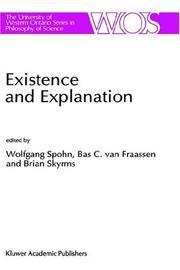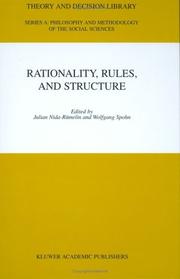| Listing 1 - 10 of 18 | << page >> |
Sort by
|

ISBN: 9781402054747 9781402054730 Year: 2009 Volume: 256 Publisher: Heidelberg Springer
Abstract | Keywords | Export | Availability | Bookmark
 Loading...
Loading...Choose an application
- Reference Manager
- EndNote
- RefWorks (Direct export to RefWorks)
In this collection I present 16 of my, I feel, more substantial papers on theoretical philosophy, 12 as originally published, one co-authored with Ulrike Haas-Spohn (Chapter14), one (Chapter 15) that was a brief conference commentary, but is in fact a suitable appendix to Chapter 14, one as a translation of a German paper (Chapter 12), and one newly written for this volume (Chapter 16), which, however, is only my recent attempt to properly and completely express an argument I had given in two earlier papers. I gratefully acknowledge permission of reprint from the relevant publishers at the beginning of each paper. In disciplinary terms the papers cover epistemology, general philosophy of science, philosophy of language, and philosophy of mind. The section titles Belief, Causation, Laws, Coherence, and Concepts and the paper titles give a more adequate impression of the topics dealt with. The papers are tightly connected. I feel they might be even read as unfolding a program, though this program was never fully clear in my mind and still isn't. In the Introduction I attempt to describe what this program might be, thus drawing a reconstructed red thread, or rather two red threads, through all the papers. This will serve, at the same time, as an overview over the papers collected.
kennisleer --- Theory of knowledge --- Metaphysics --- epistomologie --- metafysica --- taalfilosofie --- Philosophy of science --- persoonlijkheidsleer --- Philosophy of language --- epistemologists --- metaphysics --- Psychology --- Logic --- Germany

ISBN: 1402054734 9400787057 9786611875886 1281875880 1402054742 Year: 2009 Publisher: [Dordrecht] : Springer,
Abstract | Keywords | Export | Availability | Bookmark
 Loading...
Loading...Choose an application
- Reference Manager
- EndNote
- RefWorks (Direct export to RefWorks)
In this collection I present 16 of my, I feel, more substantial papers on theoretical philosophy, 12 as originally published, one co-authored with Ulrike Haas-Spohn (Chapter14), one (Chapter 15) that was a brief conference commentary, but is in fact a suitable appendix to Chapter 14, one as a translation of a German paper (Chapter 12), and one newly written for this volume (Chapter 16), which, however, is only my recent attempt to properly and completely express an argument I had given in two earlier papers. I gratefully acknowledge permission of reprint from the relevant publishers at the beginning of each paper. In disciplinary terms the papers cover epistemology, general philosophy of science, philosophy of language, and philosophy of mind. The section titles Belief, Causation, Laws, Coherence, and Concepts and the paper titles give a more adequate impression of the topics dealt with. The papers are tightly connected. I feel they might be even read as unfolding a program, though this program was never fully clear in my mind and still isn’t. In the Introduction I attempt to describe what this program might be, thus drawing a reconstructed red thread, or rather two red threads, through all the papers. This will serve, at the same time, as an overview over the papers collected.
Causation. --- Linguistics. --- Metaphysics. --- Philosophy. --- Philosophy & Religion --- Speculative Philosophy --- Philosophy --- Science --- Normal science --- Philosophy of science --- Causality --- Cause and effect --- Effect and cause --- Final cause --- Epistemology. --- Language and languages --- Philosophy of mind. --- Philosophy and science. --- Philosophy of Science. --- Philosophy of Language. --- Philosophy of Mind. --- Beginning --- God --- Metaphysics --- Necessity (Philosophy) --- Teleology --- Genetic epistemology. --- Linguistics --- Ontology --- Philosophy of mind --- Developmental psychology --- Knowledge, Theory of --- Mind, Philosophy of --- Mind, Theory of --- Theory of mind --- Cognitive science --- Philosophical anthropology --- Language and languages—Philosophy. --- Epistemology --- Theory of knowledge --- Psychology --- Science and philosophy
Book
ISBN: 9780199697502 Year: 2012 Publisher: Oxford Oxford university press
Abstract | Keywords | Export | Availability | Bookmark
 Loading...
Loading...Choose an application
- Reference Manager
- EndNote
- RefWorks (Direct export to RefWorks)
"Wolfgang Spohn presents the first full account of the dynamic laws of belief, by means of ranking theory. This book is his long-awaited presentation of ranking theory and its ramifications. He motivates and introduces the basic notion of a ranking function, which recognises degrees of belief and at the same time accounts for belief simpliciter. He provides a measurement theory for ranking functions, accounts for auto-epistemology in ranking-theoretic terms, and explicates the basic notion of a (deductive or non-deductive) reason. The rich philosophical applications of Spohn's theory include: a new account of lawlikeness, an account of ceteris paribus laws, a new perspective on dispositions, a rich and detailed theory of deterministic causation, an understanding of natural modalities as an objectification of epistemic modalities, an account of the experiential basis of belief--and thus a restructuring of the debate on foundationalism and coherentism (and externalism and contextualism)--and, finally, a revival of fundamental a priori principles of reason fathoming the basics of empiricism and the relation between reason and truth, and concluding in a proof of a weak principle of causality. All this is accompanied by thorough comparative discussions, on a general level as well as within each topic, and in particular with respect to probability theory."--Publisher's website.
Belief and doubt --- Causation --- Idea (Philosophy) --- Reason
Book
Year: 1991 Publisher: Boston Kluwer
Abstract | Keywords | Export | Availability | Bookmark
 Loading...
Loading...Choose an application
- Reference Manager
- EndNote
- RefWorks (Direct export to RefWorks)
Book
ISBN: 3465013654 9783465013655 Year: 1979 Publisher: Frankfurt am Main Klostermann
Abstract | Keywords | Export | Availability | Bookmark
 Loading...
Loading...Choose an application
- Reference Manager
- EndNote
- RefWorks (Direct export to RefWorks)

ISBN: 079231252X 9401054304 9401132445 9780792312529 Year: 1991 Volume: 49 Publisher: Dordrecht Kluwer
Abstract | Keywords | Export | Availability | Bookmark
 Loading...
Loading...Choose an application
- Reference Manager
- EndNote
- RefWorks (Direct export to RefWorks)
Filosofie [Moderne ] --- Philosophie moderne --- Philosophy [Modern ] --- Science --- Philosophy, Modern. --- Philosophy. --- Philosophy, Modern --- -Natural science --- Science of science --- Sciences --- Modern philosophy --- Philosophy --- Lambert, Karel --- -Philosophy --- Science - Philosophy. --- Lambert, Karel, 1928 --- -Science --- -Philosophy, Modern. --- Normal science --- Philosophy of science --- Lambert, Karel, --- Lambert, Joseph Frederick, --- -Philosophy, Modern --- -Science - Philosophy.
Book
ISBN: 0262045079 026236185X 0262366177 Year: 2021 Publisher: London, England : The MIT Press,
Abstract | Keywords | Export | Availability | Bookmark
 Loading...
Loading...Choose an application
- Reference Manager
- EndNote
- RefWorks (Direct export to RefWorks)
"This handbook is the most authoritative and comprehensive guide through the psychology and philosophy of human rationality demonstrating the complex relationship between norms of rationality and actual human thinking"--
Logic. --- Philosophy of mind. --- Reason. --- Reasoning (Psychology) --- Cognitive psychology.
Book
ISBN: 9783465040316 Year: 2007 Publisher: Frankfurt am Main Klostermann
Abstract | Keywords | Export | Availability | Bookmark
 Loading...
Loading...Choose an application
- Reference Manager
- EndNote
- RefWorks (Direct export to RefWorks)
Book
ISBN: 9780262045070 Year: 2021 Publisher: Cambridge, Mass. MIT press
Abstract | Keywords | Export | Availability | Bookmark
 Loading...
Loading...Choose an application
- Reference Manager
- EndNote
- RefWorks (Direct export to RefWorks)

ISBN: 0792363264 9048154634 9401596166 9780792363262 Year: 2000 Volume: 28 Publisher: Dordrecht Boston Kluwer Academic Publishers
Abstract | Keywords | Export | Availability | Bookmark
 Loading...
Loading...Choose an application
- Reference Manager
- EndNote
- RefWorks (Direct export to RefWorks)
It is an obvious fact that human agency is constrained and structured by many kinds of rules: rules that are constitutive for communication, morality, persons, and society, and juridical rules. So the question is: what roles are played by social rules and the structural traits of human agency in rational decision making? What bearing does this have on the theory of practical rationality? These issues can only be discussed within an interdisciplinary setting, with researchers drawn from philosophy, decision theory and the economic and social sciences. The problem is of profound, fundamental concern to the social scientist and has attracted a great deal of intellectual effort. Contributors include distinguished researchers in their respective fields and the book thus presents state-of-the-art theory. It can also be used as a textbook in advanced philosophy, economics and social science classes.
Reasoning --- Social norms --- Congresses --- Social aspects --- Ontology. --- Philosophy. --- Modern philosophy. --- Philosophy and social sciences. --- Philosophy, general. --- Modern Philosophy. --- Philosophy of the Social Sciences. --- Social sciences and philosophy --- Social sciences --- Modern philosophy --- Mental philosophy --- Humanities --- Being --- Philosophy --- Metaphysics --- Necessity (Philosophy) --- Substance (Philosophy) --- Reasoning - Congresses. --- Social norms - Congresses.
| Listing 1 - 10 of 18 | << page >> |
Sort by
|

 Search
Search Feedback
Feedback About UniCat
About UniCat  Help
Help News
News